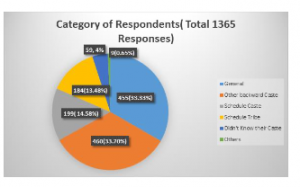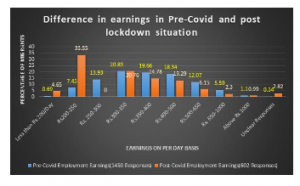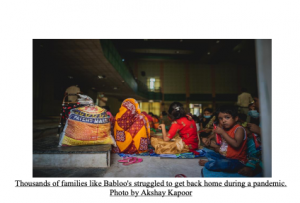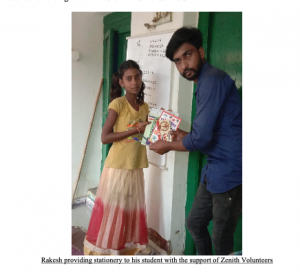The M.P. Migrant Workers project is an initiative by Rakshita Agarwal (graduate of National Law University Odisha), Rohit Sharma (graduate of West Bengal National University of Juridical Sciences), and Lakshay Gupta (final year student, GGS Indraprastha University, New Delhi) carried out in association with Zenith Society for Socio-Legal Empowerment, Shivpuri, (M.P.). The project aims to throw light on the current employment status of migrant workers who had come back to Madhya Pradesh (home state) because of COVID-19. The summary version of the report, based on 1500 responses from 52 districts of M.P., draws our attention to the miserable condition of these workers and calls for immediate actions.
The sudden nation-wide lockdown announced in March 2020 resulted in India’s biggest migrant labour crisis. After much hue and cry, the migrant workers were somehow sent back to their villages but, surprisingly, their plight was quickly forgotten. No attempts were made to follow up on their livelihood and living conditions after their transportation. Recognising the importance (and dearth) of post-transport assistance to these workers, the M.P. Migrant Workers project was initiated. More than 60 people, coming from different fields of study, volunteered for the project and completed the humongous task in 1.5 months.
For the purpose of this project, the volunteers contacted migrant workers who had come back to Madhya Pradesh from Maharashtra. Based on a questionnaire developed by the co-ordinators specifically for this purpose, the migrant workers were asked about a number of things ranging from the support received during their travel to their current employment status. The key highlights of the summary findings are as under:
- Around 90% of the people have not yet received any kind of monetary help from the government despite being promised about the same.
- 5% of the migrant labourers continue to remain unemployed even after 4 months of their return to M.P. In fact, 585 out of 1291 people (around 45.3%) are not even aware of even a single employment scheme that has been introduced for them. Further, 67% of total respondents admitted that they do not have sufficient means to run their families and need urgent support.
- The earning patters of those who are employed also present a gloomy picture. At their original places of work in Maharashtra, majority of the respondents (almost 59% of 1450 people) earnt between Rs. 300-500 per day. In the post-lockdown scenario, this number has gone down by 10% and only 49% of the respondents earn between Rs. 300-500 per day in Madhya Pradesh. This significantly impacts the standard of living of these workers.
- Despite a number of directions being issued by the Honb’le Supreme Court such as maintaining records of returned workers, introducing employment schemes, establishing counselling centres etc., the results suggest that none of these directions have been followed by the state.
- However, the report also represents some pleasant pictures. Findings suggest that the government has performed fairly well in terms of transportation of these workers. Almost 58% of the respondents said that the tickets for their travel were funded entirely by the government. Majority also stated that bus facilities were provided to them from railway stations to their respective villages.
- Speaking of the future, 51.79% of people wish to settle in Madhya Pradesh permanently and want employment opportunities here. Up till now, around 310 people have already left M.P. in search of job opportunities. There are many others (around 45% of total respondents) who are considering the idea of moving to other states owing to extensive unemployment and dysfunctional government schemes in M.P.
The co-ordinators of this Project hope to bring real, ground level changes through their findings. To ensure the same, they are approaching bureaucrats and government officials in the state of Madhya Pradesh with possible plan of action to remedy the situation. The project is ongoing and the final version of the report shall be released in upcoming months.
M.P. Migrant Workers Project [Executive Summary]
The Covid-19 Pandemic has affected almost everyone, but some sections are worse hit than others. The migrant labourers of India are one such category.
It is common for the working class in India to temporarily move to other states in search of better job opportunities. With a sudden nation-wide lockdown being announced in March 2020, these migrant labourers were stranded in their host states of work, far away from their homes and families. After much hue and cry, steps were taken to safely transport these workers back to their home states. However, there has been no update on their employment status or standard of living since then and a huge data gap remains in this regard.
With the objective of filling this gap, the M.P. Migrant Workers Project was initiated by co-ordinators Rakshita Agarwal, Rohit Sharma, and Lakshay in association with Zenith Society for Socio-Legal Empowerment, Shivpuri, Madhya Pradesh. The main purpose of this study is to shed light on the current employment status of migrant labourers who have returned to Madhya Pradesh during the lockdown. It also aims to know the extent of State intervention and aid provided to these workers throughout the process – starting from their journey from host states to settlements in their villages. Besides making us aware of the ground realities, the findings of this report are important as they can guide immediate policy decisions relating to migrant labourers. A 360-degree analysis of the current approach will help us identify the strengths and weaknesses and further ensure that we are better equipped to deal with such situations in the future.
This executive summary accounts for 1500 respondents from 52 districts of Madhya Pradesh wherein the respondents answered a questionnaire which was devised by the coordinators in consultation with industry experts, civil societies, and governmental officials. A detailed report which includes multiple other factors shall be released in the upcoming months.
We could not have done this without the help of our volunteers. For the purposes of this Study, our dedicated volunteer team relied on first-hand data of migrant workers who travelled from the state of Maharashtra to Madhya Pradesh during the lockdown period.
Through this executive summary, we aim to draw everyone’s attention to the plight of these migrant workers and highlight the most pressing issues which require immediate attention. We further hope that the findings will prompt speedy relief action and encourage the development of a sustainable model for upcoming months to ensure that the employment conditions of these migrant workers are improved and they lead a life of dignity.
I. BASIC DEMOGRAPHICS
● Caste – Out of 1365 responses received, around one-third respondents (33%) belonged to Other Backward Classes (OBC)and General Category. 14.5% and 13.4% of the respondents identified themselves as Scheduled Castes (SCs) and Scheduled Tribes (STs) respectively.

● Age – Around 60% of the respondents belonged to the working age-group of 21 to 30 years. Within that, the highest number (31%) fell in the range of 21-25 years.
● Gender- 89% of the total respondents were males and 10.38% were females. 4 people (0.26%) preferred not to disclose their gender.
● Number of dependents- Out of 1409 responses received, 50% of the respondents revealed that approximately 4 to 6 people depended solely on their income. Additionally, 176 people (12.5% of respondents) said that they were the only earning member in a family of 7 or more people.
II. EXTENT OF MONETARY ASSISTANCE RECEIVED
● What was promised – The Madhya Pradesh State Government had announced in the month of April 2020 that returning labourers shall receive Rs 1,000 directly in their bank accounts. Additionally, it was also assured that in case more money is required, the money shall be credited in the accounts.
● Following up on this promise of monetary aid and assistance, our findings reveal that around 90% of the 1460 respondents did not receive any money from the government. Remaining 10%, however, said that they did receive some amount. Most of the people were still desperately waiting for the money.
III. WIDESPREAD UNEMPLOYMENT (TOTAL RESPONSES – 1455)
● As far as the employment status of these migrant workers is concerned, 56.5% said that they are currently unemployed. Almost 67% also asked for immediate administrative support to run their families.
● While 43% said that they are undertaking some kind of work, the situation is worrisome. 135 of the 617 people (around 22%) who identified themselves as employed are engaged in agriculture-related work or farming in their own fields. In some cases, the entire family works on a single field giving rise resulting in cases of disguised unemployment.
● It is also important to note that only 602 individuals answered questions about their current earnings (i.e. for the post-lockdown phase) as opposed to 1450 individuals before the pandemic which points towards unemployment on a large scale. In simple terms, most of the earlier employed people have not been able to find suitable job opportunities in Madhya Pradesh yet.
● As far as the performance of various employment schemes of Madhya Pradesh is concerned, 585 (45.31%) out of 1291 people said that they were not aware of any such schemes. A total of 706 respondents said that they were aware of at least one of such schemes. The exact representation of the responses (scheme-wise) for this question is as under:
| Name of the Scheme | Number of Respondents who knew about it |
| Naya Savera Yojana for labourers | 100 people (7.75%) |
| Shram Siddhi Abhiyaan | 112 people (8.68%) |
| MP Jeevan Shakti Yojana | 133 people (10.30%) |
| MP Rojgar Setu Yojana 2020 | 247 people (19.13%) |
| Mukhya Mantri Jan Kalyan (Sambal) Yojana | 254 people (19.68%) |
| MGNREGA | 359 people (27.81%) |
| Pradhan Mantri Awas Yojana Grameen | 494 people (38.27%) |
| Others | 13 people (1.07%) |
IV. CHANGE IN EARNING PATTERNS
● The earning capacity of those who are employed has also been drastically affected. To give our readers a perspective, we have presented a contrast of their earnings during the pre- covid and post lockdown era.

● The graph clearly illustrates that before Covid-19, more number of respondents fell in comparatively higher income groups (those who earnt 350 or more per day). Since their return to Madhya Pradesh, the number of respondents for high-income groups has been consistently declining. This negatively impacts their standard of living.
● As far as the current situation is concerned, around 40% (majority) of respondents earn less than Rs.250 per day. This is a matter of grave concern as only 8% of them belonged to this income group before Covid.
V. NON-OBSERVANCE OF SUPREME COURT DIRECTIONS
● To ensure that the returning migrant workers find sufficient employment opportunities in their home states, the Hon’ble Supreme Court of India vide its order dated 9th June 2020 had issued the following directions:
- Each State was required to maintain a record of all such migrant workers who were coming back. The details of migrant workers, nature of their skill, place of their earlier employment were required to be maintained in prescribed proforma formulated by the concerned State at the village level, block level and the district level so that necessary help could be extended by the State authorities and district authorities to these migrant labourers.
- Counselling centres were required to be set up by the concerned State at the block level and the district level to provide all information regarding Government schemes and other avenues of employment to these workers and where possible to expand the avenues of employment to these workers so that they may not sit idle and they may be utilised as a resource by the State.
- The States were also expected to provide the necessary information and facilitate the return of the workers who wanted to return to their employment. Necessary information could be provided by the State in this regard by creating the help desk with the help of railway authorities and road transport authorities.
● Actual action in respect of the above-mentioned directions has been dismal. Only 14.07% (198) of 1407 respondents mentioned that their nature of skill (skilled or unskilled) was recorded. The majority of respondents (66.24%) said that only the basic details (such as Name, Age, Gender, Place of work, Village etc.) were asked. Recording the nature of skill was required as the same could have helped the state in locating suitable job opportunities for these workers and supporting their livelihood.
● Moreover, only 8.18% of respondents mentioned that they had information of or accessibility to counselling centres or state aid camps.
● Similarly, only 9.11% of people said that some kind of awareness or sensitization programs on re-employment was organised in their villages. The majority of respondents were not aware of even a single government employment scheme.
VI. AREAS WHERE THE STATE PERFORMED WELL
● The study has highlighted certain areas where the State and government actually did a good job and made things for the migrant workers easier. The most significant work has been done in relation to the travel of these workers.
● Online Registration – Out of 1481 people, 68% had registered themselves online with the government to facilitate their transport from the host state to home state. 39% of them received assistance from the state to complete the process.
● Extensive assistance – The data further reveals that 52% of the respondents were in possession of smartphones while the other 48% had to rely on offline modes for registration. On a brighter side, out of 578 responses received for offline registration, 390 people (67.5%) said that they were duly assisted by government officials in the process.
● Travel funded by the government- Interestingly, in a total of 1202 people, almost 58% said that the tickets for their travel were funded entirely by the government. 494 persons out of a total of 965 (51%) said that the government had also provided for travel facilities from Railway stations to their respective villages.
● A substantial percentage (73.68%) of those who travelled through the train stated that they received food for free during the journey. More than 75% of them said that the food average and above (quality-wise) which shows that the state performed better on this front.
VII. FUTURE HOPES AND ASPIRATIONS
● Around one-quarter of the respondents (364 people) had already left Madhya Pradesh when they were responding to this survey. Out of the 332 people who stated the reason behind such a decision, an overwhelming majority (92.77%) said that lack of employment opportunities in M.P. forced them to move out. The remaining people cited family and COVID related health concerns as the primary reason.
● Additionally, many respondents (currently residing in Madhya Pradesh) said that they were considering moving to other places in near future owing to extensive unemployment and dysfunctional government schemes in their areas.
● Against this backdrop, it must be mentioned that these people are not leaving their home state and villages happily. Findings suggest that out of 1450 respondents, 51.79% responded that Madhya Pradesh is their first preference for future employment and permanent settlement. Only 3% said that they were flexible to working anywhere. Despite their aspirations of living together with their families, around 45% of the people said that they wanted to move to other states considering the current employment scenario in Madhya Pradesh.
MIGRANT STORIES: TRAGEDY AND HOPE INTERTWINED
The journey of working on this Report and the overall experience has been overwhelming for each one of us. While speaking to these people we came across remarkable stories. Some of them, being extremely ghastly, shook us to the core. At the same time, there were others, the heart-warming ones, which restored our faith in mankind and humanity. These stories, which are beyond the scope of any study, gave us a glimpse into the lives of these people and their everyday struggle. We decided to share a few of them with our readers.
For the purpose of safety and confidentiality, we have changed the names of the relevant parties related to the story.
1. A Messiah and a Devil in disguise – Babloo is a married man who identifies himself as belonging to the Other Backward Classes category. He used to stay in Bhopal before shifting to Pune for employment, with his family – a wife and 2 small kids. His life was going well and he used to earn a reasonable amount while working in the waterproofing and painting industry in Pune. He got to know about the lockdown through the media and heard about the unemployment situation in his industry. While his family was in Pune, all their savings were utilised and they were only left with the bare minimum to survive. Even then, due to financial constraints, he had to wait till the government announced running of special Shramik trains for the migrant workers. Babloo registered his name multiple times so that he and his family could travel back home. However, despite registering, his family’s name didn’t appear in the train list. The fear of Covid and the apathy they faced after he lost his job forced him and his family to start walking from Pune towards MP. Pune is about 789 km from Bhopal. They started walking with very little food in the hope that they would get some vehicle which could drop them off at MP borders. However, within a few hours of beginning to walk their food was finished with their children crying on multiple occasions about how their legs were paining. Babloo informed us that their family was fortunate some “Messiah” provided their family with food for the way, and that’s the only reason they could survive their walk. Fortunately, Babloo found a traveller tempo for his wife and his children who, at a low cost, promised to get them home. He was a little relieved to know that now his family could reach home safely without much trauma of displacement or pain. He took another vehicle to return home. Once he got back, he realised that his family was still not home. When his wife arrived home, she had tears in her eyes as she told him how she was molested by the driver of the tempo and the co-passengers. Babloo narrates this story with a heavy voice which not only signifies institutionalized neglect but also social neglect towards his family from all possible angles.

2. Covid 19: The Aggravating social divide – In the village of Pachokhar which falls in Tehsil- Mangawan of District- Rewa, Madhya Pradesh lives Shyam, who is a migrant worker. Shyam is the sole breadwinner of his family, who when contacted, complained of the caste discrimination in his village. Shyam belongs to OBC category which is considered to be more privileged in India than the marginalised groups belonging to Scheduled Castes and Schedule Tribes. Pachokar village panchayat is highly dominated by members belonging to the Brahmin community. As a result, most of the schemes and subsidies which are announced by the government often don’t even reach the backward and scheduled castes while the Brahmin community in the village takes advantage of almost every scheme which is announced for the villages. Shyam informs that Devi, a Scheduled Caste woman, has a broken roof above her head for years which gets even more damaged in the rainy season, and the leakage fills their houses on a regular basis. Pachokhar village gets funds under the Pradhan Mantri Awas Yojna almost every year, with the family of a local Brahmin leader having four pucca houses. The Government of MP announces schemes for cow breeding which the backward castes are not even aware of, while the same scheme provides benefits to almost every upper caste household. Shyam who belongs to OBC category once reached out to the Panchayat Secretary to create documents for availing schemes and they demanded bribe for sending these documents to higher authorities. Shyam used to have a very busy day in a district of Maharashtra wherein, before lockdown, he used to drive someone’s car for OLA and Uber and was paid around 350-400 per day, depending on the number of daily rides. However once the lockdown was announced, it came down heavily on thousands of drivers like Shyam. He is now back in his village and trying to survive on the bare minimum of facilities. He misses his time in Maharashtra but has the small relief of being with his family currently. Shyam is scared of telling this story but he also has faith that maybe, someday, these instances of apathy will be highlighted. He is also very delighted to know that someone called him to know of his employability after months. Even when he doesn’t have the resources to make his future bright, he definitely had a bright smile that someone cared enough to listen to his story.
3. Rakesh: A ray of Hope – Rakesh is from a small village called Belkhedi, in the Sehpura Tehsil of Jabalpur. He was a supervisor in a reputed company, earning around 17,000 rupees a month for his livelihood. Soon, however, Covid struck, and he had to come back to his village owing to insufficient means of sustenance. Rakesh has a diploma and good command over maths and science. And when we contacted him, we were introduced to a heart-warming story. Speaking to us, he said that once he came back, he was moved by the situation of the school students in his village who mostly failed in Maths and English, leaving their basic education hanging by a thread. These children dropped out of school as early as after 8th and 10th standard. In an entirely selfless gesture, he didn’t ask us for employment help but said that he wants to settle down in the village and he plans to start coaching for these children, where he would teach them Maths and Science for free. Moved by Rakesh’s noble intentions, Zenith Volunteers crowdfunded and sent copies, pens, and pencils for him and his students. Rakesh now wants to bring about constructive change in society. Zenith is trying to get a device for his students to ensure classes in English so he can achieve his goals and help educate the future. In these unpredictable, almost apocalyptic times, Rakesh has been a ray of shining hope, reflective of all the good that human beings can do in the world. His story only serves to remind us at Zenith why we do this work and pushes us to keep moving even when the light at the end of the tunnel seems dim.

Report Prepared by: *Rakshita Agarwal (graduate of National Law University Odisha), **Rohit Sharma (graduate of West Bengal National University of Juridical Sciences), and ***Lakshay Gupta (final year student, GGS Indraprastha University, New Delhi).






